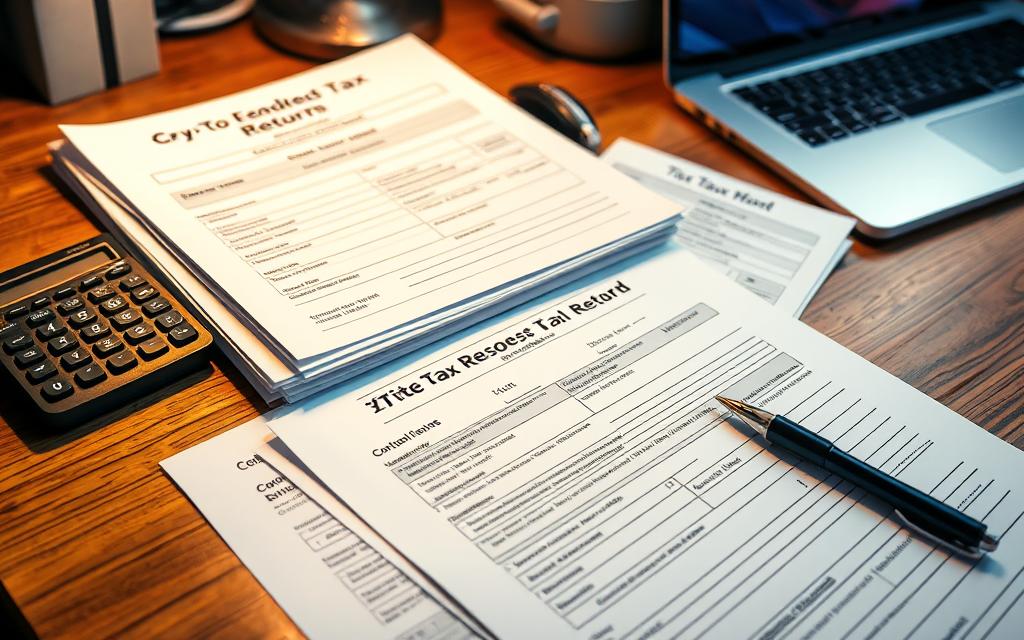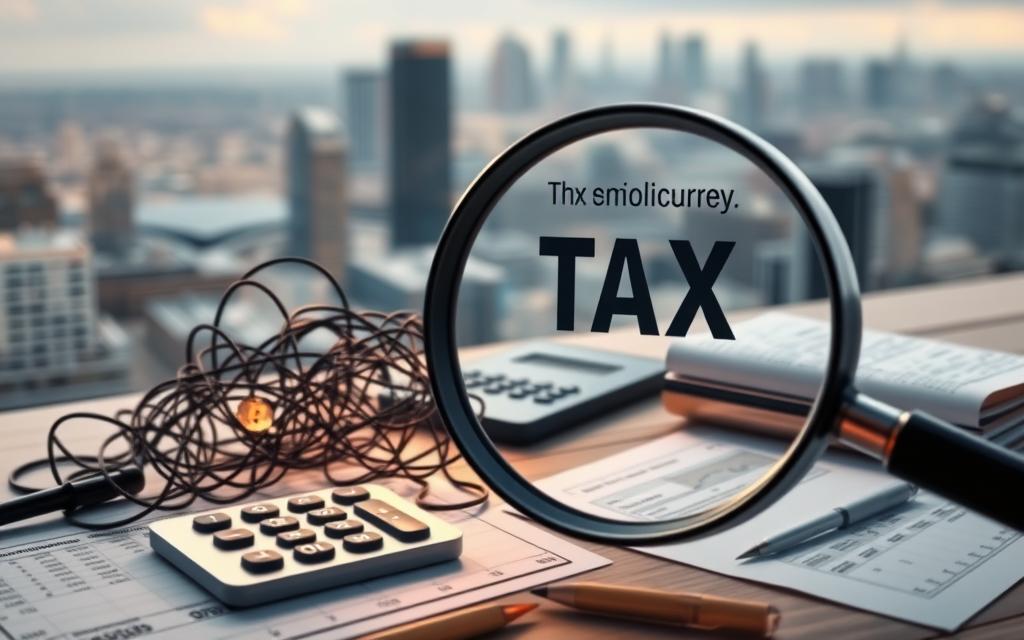Table of Contents
The IRS treats digital assets like property, meaning transactions often trigger tax events. Selling, trading, or spending cryptocurrency may result in capital gains or losses. Timing matters—taxes apply when assets are disposed of, not simply held.
Not all activities create liabilities. Transferring between personal wallets typically avoids immediate tax consequences. However, converting to fiat currency or swapping tokens usually requires reporting. The 2024 updates emphasize stricter compliance.
Accurate record-keeping proves essential. Platforms like TurboTax now support direct transaction imports for easier filing. Blockchain analytics tools help authorities track unreported income, making proper documentation critical.
How Cryptocurrency Taxation Works in the U.S.
Federal law classifies virtual assets as taxable property under IRS guidelines. This designation means every sale, trade, or payment using digital currencies may create a tax obligation. Unlike traditional investments, even small transactions require careful tracking.
IRS Classification of Crypto as Property
The IRS solidified its stance in Notice 2014-21, stating:
“Virtual currency is treated as property for federal tax purposes. General tax principles applicable to property transactions apply.”
This classification aligns cryptocurrency with stocks or real estate. Gains or losses must be reported annually, similar to selling physical assets.
Taxable vs. Non-Taxable Events
Not all activities trigger liabilities. Below is a breakdown of common scenarios:
| Taxable Events | Non-Taxable Events |
|---|---|
| Selling for fiat currency | Buying with cash |
| Trading between tokens | Holding long-term |
| Spending on goods/services | Personal wallet transfers |
| Earning staking rewards | Gifts under $16,000 (2024) |
Mining and staking are treated as income tax at receipt, while sales fall under capital gains. TurboTax Premium simplifies tracking, supporting 20,000+ transaction imports.
Misclassifying events risks audits. The IRS uses blockchain analytics to identify discrepancies. Proper documentation, including dates and fair market values, is essential.
Do You Pay Taxes on Crypto Before Withdrawal? Key Scenarios
Converting digital assets to cash or other tokens often creates tax liabilities. The IRS considers these transactions taxable events, similar to selling stocks or real estate. Timing and method of disposal determine the final tax burden.
Converting to Cash: What Triggers Liability
Withdrawing to fiat currency requires calculating capital gains based on purchase price and sale value. For 2024, single filers earning ≤$47,025 may qualify for 0% rates on long-term holdings. Short-term disposals face ordinary income rates up to 37%.
- FIFO method defaults for cost basis unless specified otherwise
- Partial withdrawals must track original purchase lots
- State withholding rules vary (e.g., New York vs. Texas)
Asset Retention Versus Disposition
Merely holding digital currencies incurs no immediate tax consequences. Liability arises only during:
| Triggering Actions | Non-Taxable Situations |
|---|---|
| Exchange trades | Personal wallet transfers |
| Fiat conversions | Unrealized gains |
| Spending on services | Gifts below annual exclusion |
Platforms like CoinLedger automate cost basis tracking across multiple purchases. Unlike traditional securities, crypto enjoys wash sale rule exemptions—allowing immediate repurchases after sales.
Proper documentation proves critical. The IRS receives 1099 forms from major exchanges, enabling automated matching of reported transactions. Discrepancies may trigger audits or penalties.
Capital Gains Tax on Cryptocurrency
Understanding capital gains tax on cryptocurrency requires knowing how holding periods affect your liabilities. The IRS taxes profits from digital asset sales differently based on whether they’re classified as short-term or long-term. Proper classification can significantly reduce your tax burden.
Short-Term vs. Long-Term Capital Gains
Assets held for ≤1 year trigger short-term capital gains, taxed as ordinary income. For 2024, rates range from 10% to 37%. Long-term holdings (>1 year) qualify for reduced rates of 0%, 15%, or 20%, depending on income.
Key differences:
- Short-term: Higher rates, ideal for quick trades but costly tax-wise
- Long-term: Lower rates, beneficial for strategic investors
- Married filing separately faces steeper brackets than joint filers
2024 Tax Rates and Brackets
Below are the federal tax rates for crypto gains in 2024:
| Filing Status | 0% Rate | 15% Rate | 20% Rate |
|---|---|---|---|
| Single | ≤$47,025 | $47,026–$518,900 | >$518,900 |
| Married Jointly | ≤$94,050 | $94,051–$583,750 | >$583,750 |
| Head of Household | ≤$63,000 | $63,001–$551,350 | >$551,350 |
Additional considerations:
- Net Investment Income Tax (NIIT): Adds 3.8% for incomes >$200,000 (single) or $250,000 (joint)
- State taxes: California imposes up to 13.3%, while Texas has none
- TurboTax’s capital gains calculator helps estimate liabilities across brackets
Strategic investors use capital loss harvesting to offset gains. Unlike stocks, crypto isn’t subject to wash sale rules, allowing immediate repurchases after sales. Always document purchase dates and market value to prove holding periods.
Income Tax on Crypto Earnings
Earning digital assets through mining, staking, or airdrops creates immediate income tax obligations. The IRS treats these gains as taxable upon receipt, requiring accurate valuation and reporting. Unlike capital gains, these activities often fall under ordinary income rates.
Mining, Staking, and Airdrops
Mining rewards are taxed at their fair market value when received. For business miners, self-employment tax (15.3%) applies. Staking and airdrops follow similar rules—value is locked at receipt, even if tokens are illiquid.
Key considerations:
- Valuation challenges: Use exchange rates or third-party tools for illiquid coins.
- Form 1099-NEC: Filed by mining pools for earnings over $600.
- DeFi yields: Taxed as income, not capital gains, per IRS guidance.
Reporting as Ordinary Income
Crypto earnings must be reported on Schedule 1 (Form 1040) as ordinary income. Estimated quarterly payments may be required to avoid penalties. TurboTax’s self-employment module simplifies tracking deductions like hardware or electricity costs.
Audit risks rise if:
- Income is unreported or undervalued.
- 1099 forms mismatch taxpayer records.
- State filings omit crypto earnings (e.g., California’s 1%–13.3% rates).
Calculating Your Crypto Tax Liability
Accurate tax calculations start with understanding your cost basis in digital assets. This foundational figure determines gains or losses when disposing of holdings. Meticulous record-keeping prevents costly errors during filing.
Determining Cost Basis
The IRS defines cost basis as purchase price plus any fees (e.g., exchange or gas fees). For example:
“Cost basis = Purchase price + Fees. Proceeds = Sale price – Fees.”
Common challenges include:
- Lost records: Use exchange APIs or blockchain explorers to reconstruct history.
- Gifted/inherited crypto: Basis resets to fair market value at receipt.
- Hard forks: Allocate basis between original and new coins.
Adjusting for Fees and Transactions
Network and exchange fees reduce taxable gains. TurboTax automates this tracking for 20+ platforms. Key considerations:
| Scenario | Impact on Basis |
|---|---|
| Margin trading | Interest fees added to basis |
| DeFi swaps | Gas fees deducted from proceeds |
| Staking rewards | Fees offset income reported |
Audit-proof documentation includes timestamps, wallet addresses, and exchange receipts. Tools like CoinLedger compare data across transactions for discrepancies.
Reporting Cryptocurrency on Your Tax Return
Properly documenting cryptocurrency transactions ensures accurate tax return compliance. The IRS requires detailed records for all disposals, including trades, sales, and spending. Missing or incorrect filings risk penalties or audits.

Form 8949 and Schedule D
Every taxable event must be reported on Form 8949, which transfers totals to Schedule D. The IRS mandates line-by-line entries for:
- Date acquired and sold
- Cost basis and proceeds
- Gain/loss calculations
“Use Form 8949 to report capital gains and losses before summarizing on Schedule D.”
TurboTax auto-populates these forms using imported exchange data. Discrepancies between personal records and 1099s require reconciliation to avoid flags.
Form 1099-DA (2025 Update)
Starting in 2025, exchanges must issue Form 1099-DA for all transactions. This standardized report includes:
| Data Point | Purpose |
|---|---|
| Transaction hash | Blockchain verification |
| Fair market value | Income/capital gains calculation |
| Asset type | NFT vs. token classification |
Key actions for 2024 filings:
- Cross-check exchange 1099s with personal logs
- Report NFTs as collectibles (28% rate if held >1 year)
- File FBAR/Form 8938 for foreign assets exceeding $10,000
Amended returns (Form 1040-X) correct errors within three years. Retain proof of filing—digital or paper—for seven years.
Tax-Free Cryptocurrency Transactions
Not all cryptocurrency activities trigger immediate tax liabilities—some remain tax-free under current regulations. Understanding these exceptions helps optimize financial strategies while maintaining compliance.
Buying and Holding
Purchasing digital assets with fiat currency incurs no tax obligations. Long-term holding also avoids liabilities until disposal. Key considerations:
- Cold storage: Offline wallets don’t alter tax status.
- Inheritance: Basis resets for heirs at fair market value.
- Charitable trusts: Defer capital gains by donating appreciated crypto.
Wallet-to-Wallet Transfers
Moving crypto between personal wallets isn’t taxable. However, proof of ownership is critical for audit protection. Examples include:
| Tax-Free Action | Documentation Needed |
|---|---|
| Self-custody transfers | Wallet addresses, timestamps |
| Multi-signature setups | Ownership verification |
| Cross-chain moves | Transaction hashes |
“Transfers between wallets you own aren’t reportable events if no change in beneficial ownership occurs.”
Gifts under $18,000 (2024) also qualify as tax-free. TurboTax simplifies tracking these transactions with direct exchange integrations.
Crypto Mining and Tax Obligations
Crypto miners must report income at receipt, regardless of asset liquidity. The IRS classifies mined coins as taxable property, valuing them at fair market value when earned. Proper documentation ensures compliance and minimizes audit risks.
Fair Market Value at Receipt
Mining rewards are taxed upon generation, even if unsold. Use exchange rates or third-party tools to determine fair market value for illiquid tokens. Key considerations:
- Pool mining: Allocate rewards based on contribution percentages.
- Depreciation: Deduct ASIC hardware costs over 5 years (IRS Section 179).
- Energy costs: Track electricity usage for potential deductions.
Self-Employment Tax Considerations
Business miners file Schedule C, subject to 15.3% self-employment tax. Hobby miners cannot deduct expenses but still report income. Below contrasts key requirements:
| Business Miners | Hobby Miners |
|---|---|
| File Schedule C | Report on Schedule 1 |
| Deduct hardware/energy | No expense deductions |
| Pay quarterly estimates | Annual filing only |
| State licenses required | No registration needed |
“Miners operating as a business must pay self-employment tax on net earnings.”
TurboTax’s Schedule C wizard simplifies tracking for business miners. International operations may face additional reporting via FBAR or Form 8938.
Staking Rewards and Taxation
Validators and delegators face unique tax considerations when earning staking income. Unlike mined assets, rewards from Proof-of-Stake networks are taxed as ordinary income upon receipt. Subsequent sales may trigger capital gains, creating layered reporting requirements.
Income Recognition Timing
The IRS mandates that staking rewards be valued at fair market value when earned. This applies even if tokens are illiquid or locked. TurboTax’s staking tracker simplifies reporting by auto-importing exchange data.
Key scenarios:
- Liquid staking derivatives: Taxed upon receipt, with gains calculated at sale.
- Validator nodes: Business operators deduct hardware costs; hobbyists report gross income.
- Cross-chain rewards: Track each network’s exchange rates separately.
Double Taxation Risks
Some jurisdictions tax rewards twice—as income at receipt and as gains upon disposal. Tax treaties may offer relief, but documentation is critical. Below contrasts U.S. and international treatments:
| Scenario | U.S. Treatment | Common International Rules |
|---|---|---|
| Staking-as-a-Service | Ordinary income (Form 1099-MISC) | VAT/GST in EU/UK |
| Lost stake penalties | Deductible as capital loss | No deduction (e.g., Germany) |
| State variations | Texas: No tax | Switzerland: Wealth tax |
“Pending IRS guidance may clarify staking for decentralized networks, but current rules require conservative reporting.”
Using Crypto for Goods and Services
Businesses accepting crypto payments must navigate complex reporting requirements. Both consumers and merchants face tax consequences when using digital assets for goods services. The IRS treats these transactions as disposals, potentially triggering capital gains or ordinary income reporting.

Capital Gains on Spending
Purchasing items with digital currencies counts as a taxable event. The capital gains calculation uses the asset’s purchase price versus its value at spending. TurboTax’s retail module helps track these disposals automatically.
Key scenarios:
- Point-of-sale systems: Integrated tax calculators determine liabilities in real-time
- Cross-border transactions: May create sales tax nexus in multiple states
- Token utility status: Security-classified assets face stricter reporting
Business Income Reporting
Companies accepting digital payments must record the fair market value as revenue. Inventory valuation methods (FIFO/LIFO) apply similarly to traditional assets. Below contrasts consumer and merchant obligations:
| Scenario | Consumer Responsibility | Business Requirement |
|---|---|---|
| Coffee purchase | Report capital gain/loss | Record sale at FMV + sales tax |
| B2B payment | N/A | Issue 1099 for $600+ transactions |
| Payroll in crypto | W-2 income reporting | Withhold payroll taxes |
“Merchants must convert crypto payments to USD equivalent on the transaction date for accurate bookkeeping.”
Accounting software like QuickBooks now supports automatic crypto valuation. The travel rule requires identifying parties for transactions exceeding $3,000, adding another compliance layer for goods services providers.
Exchanging Cryptocurrencies
Trading one digital asset for another triggers immediate tax consequences under current IRS rules. Since 2018, the agency has prohibited like-kind exchanges for crypto, classifying all swaps as taxable events. This change eliminated a popular deferral strategy used in traditional markets.
Like-Kind Exchange Rules
The IRS clarified its stance in 2018, stating:
“Section 1031 like-kind exchange treatment does not apply to cryptocurrency transactions. Each trade constitutes a taxable disposition.”
Key implications:
- DEX vs. CEX: Decentralized exchanges still require manual reporting
- Form 8824: No longer applicable for crypto swaps
- Wash trades: Prohibited for stocks but allowed for digital assets
Tracking Basis Across Trades
Maintaining accurate cost basis records proves critical when exchanging assets. TurboTax offers specialized tools to track:
| Exchange Type | Reporting Challenge | Solution |
|---|---|---|
| Cross-chain bridges | Multiple wallet addresses | Transaction hash linking |
| Privacy coins | Obfuscated histories | Exchange rate snapshots |
| Atomic swaps | Simultaneous executions | Timestamp matching |
Special considerations apply to:
- Stablecoin conversions: Treated as property-to-property trades
- NFT exchanges: Basis allocation required for fractionalized assets
- Lost keys: Still require attempted basis documentation
For advanced strategies, consult our guide on capital gains tax mitigation. Proper tracking ensures compliance during audits and simplifies annual filings.
Hard Forks and Airdrops
Network upgrades and token distributions introduce unique tax challenges for digital asset holders. These events often create new coins without direct purchase, requiring special reporting considerations. The IRS treats these differently than standard crypto transactions.

Taxable Income from New Coins
Protocol changes like hard forks may generate income when new tokens appear in your wallet. The IRS requires reporting their fair market value (FMV) at receipt. TurboTax’s valuation tools help determine accurate amounts for illiquid assets.
Key scenarios requiring reporting:
- Chain splits: Identify through blockchain explorers or exchange announcements
- DeFi distributions: Even promotional tokens may create liabilities
- Unclaimed forks: Still constitute taxable events if accessible
Documentation Requirements
Proper records prove essential when reporting crypto from forks or airdrops. The IRS expects documentation showing:
| Document Type | Purpose | Retention Period |
|---|---|---|
| Blockchain receipts | Proof of ownership | 7 years |
| Exchange statements | FMV verification | 3 years after filing |
| Protocol announcements | Event timing | Indefinitely |
“Taxpayers must report the FMV of forked coins as ordinary income in the year of receipt, regardless of whether sold or exchanged.”
International holders face additional complexity. Some countries like Germany tax forks differently than the U.S. system. Always consult local regulations when dealing with cross-border airdrops.
Cryptocurrency Gifts and Donations
Strategic gifting of cryptocurrency can optimize tax liabilities while supporting charitable causes. The IRS treats these transfers differently than cash, offering unique advantages for donors. Proper documentation ensures compliance with evolving regulations.
Charitable Contribution Deductions
Donating appreciated digital assets directly to qualified charities avoids capital gains taxes. The 2024 rules allow deductions up to 30% of adjusted gross income for crypto gifts. TurboTax’s donation tracker simplifies recording these transactions.
Key requirements include:
- Appraisal documentation for gifts exceeding $5,000
- Verification of the charity’s 501(c)(3) status
- Timing based on blockchain confirmation dates
“Donors may deduct the fair market value of virtual currency given to charity if held more than one year.”
Gift Tax Implications
The $18,000 annual gift exclusion applies to digital asset transfers in 2024. Family limited partnerships can multiply this benefit across relatives. Beyond this threshold, Form 709 reporting becomes mandatory.
Strategic considerations:
| Scenario | Tax Treatment | Planning Tip |
|---|---|---|
| Spousal transfers | Unlimited marital deduction | Joint wallet ownership |
| Educational gifts | 529 plan contributions | Direct tuition payments excluded |
| Foreign recipients | FBAR reporting >$10,000 | Track exchange rates |
TurboTax supports Form 709 preparation for complex situations. Generation-skipping transfers require additional filings but offer long-term wealth preservation benefits.
Lost or Stolen Crypto: Tax Implications
Lost or stolen digital assets create unique tax challenges under current IRS rules. Unlike traditional investments, crypto losses face special limitations until 2026. Proper documentation determines whether you can claim deductions.

Casualty Loss Limitations (2018-2025)
The Tax Cuts and Jobs Act suspended most casualty loss deductions through 2025. This includes digital assets lost in:
- Exchange bankruptcies (e.g., FTX collapse)
- DeFi protocol hacks or rug pulls
- Cold storage failures or forgotten keys
“Personal casualty losses are deductible only if attributable to a federally declared disaster.”
Theft Reporting Requirements
Stolen assets require police reports for potential tax claims. The IRS mandates:
- Filing within the same year as the theft
- Detailed blockchain evidence showing ownership
- Proof of stolen funds not being recoverable
TurboTax’s loss documentation tool helps organize these records. State consumer protection laws may offer additional recourse for verified theft cases.
How the IRS Tracks Cryptocurrency
Exchange reporting requirements have transformed how the IRS identifies unreported crypto income. Advanced analytics and mandatory disclosures create multiple verification layers for digital asset transactions. Both centralized platforms and blockchain networks now feed data directly to tax authorities.
Exchange Reporting (Form 1099)
Major platforms must file forms documenting user activity. The 2025 Form 1099-DA will standardize this process with:
- Transaction hashes for blockchain verification
- Fair market values at time of disposal
- Asset classifications (security vs. commodity)
Recent enforcement actions demonstrate this power:
| Case | Outcome |
|---|---|
| Coinbase summons (2016) | 14,000 accounts identified |
| Kraken John Doe order (2021) | $20,000+ transaction records obtained |
“Virtual currency exchanges must report certain transactions to the IRS, just as stockbrokers report securities transactions.”
Blockchain Analytics Tools
The IRS contracts firms like Chainalysis to trace wallet activity. Their techniques include:
- Cluster analysis linking anonymous addresses
- Mixer/tumbler detection algorithms
- Privacy coin transaction mapping
International cooperation expands these capabilities:
| Method | Coverage |
|---|---|
| FATCA agreements | 100+ countries share data |
| J5 Task Force | 5-nation crypto crime unit |
TurboTax’s audit defense now includes blockchain analysis reviews. Whistleblower programs further enhance detection, offering 15-30% rewards for tax evasion tips.
Record-Keeping Best Practices
Effective record-keeping transforms chaotic crypto transactions into organized tax reports. The IRS requires dates, amounts, and fair market values for all disposals. Proper documentation minimizes audit risks and ensures accurate filings.
Transaction Documentation
Secure methods to track activity include:
- API key protocols: Encrypt exchange connections while allowing data imports
- Multi-platform reconciliation: Match wallet addresses across DeFi and CEX activity
- NFT metadata: Record token IDs and collection details for collectibles tax
“Taxpayers must retain records substantiating transactions for seven years after filing.”
Tax Software Integration
Tax software like TurboTax streamlines compliance:
- Direct CSV imports from 20+ exchanges
- Cloud storage for decentralized ledger backups
- Automatic tax lot optimization for cost basis
Manual tracking struggles with complex scenarios:
| Method | Advantages | Limitations |
|---|---|---|
| Spreadsheets | Customizable | Prone to human error |
| Automated tools | Real-time sync | Subscription costs |
| Hybrid approach | Flexibility + accuracy | Learning curve |
For DeFi liquidity pools, specialized tools report crypto earnings across multiple chains. Disaster recovery plans should include encrypted wallet backups and transaction hash archives.
Conclusion: Navigating Crypto Taxes With Confidence
Mastering digital asset compliance requires understanding evolving IRS protocols. As regulations tighten, professional consultation ensures accurate filings and optimal strategies.
TurboTax simplifies tracking cryptocurrency transactions with automated imports. Their specialized tools calculate gains and losses across exchanges.
Prepare for 2025 changes like Form 1099-DA, which standardizes reporting. Quarterly estimated payments help avoid penalties for high earners.
Final compliance checklist:
- Reconcile all exchange statements
- Document wallet transfers
- Report crypto income from staking/forks
- Review state-specific rules
Strategic portfolio rebalancing can minimize tax burdens. Stay informed as legislation continues evolving.
FAQ
How does the IRS classify cryptocurrency for tax purposes?
The IRS treats digital assets as property, meaning capital gains and income tax rules apply. Transactions may trigger taxable events based on fair market value.
When do I owe taxes on cryptocurrency holdings?
Tax obligations arise when selling, trading, or using crypto for goods and services. Simply holding or transferring between personal wallets doesn’t create liability.
What’s the difference between short-term and long-term capital gains?
Assets held under one year face ordinary income rates (10%-37%). Long-term holdings over 12 months qualify for reduced rates (0%-20%) based on your tax bracket.
Are staking rewards considered taxable income?
Yes, the IRS treats staking rewards as ordinary income at their fair market value when received. These must be reported alongside other earnings.
How do I calculate cost basis for crypto transactions?
Basis equals the original purchase price plus fees. Specific identification (FIFO, LIFO) or average cost methods help track gains and losses accurately.
What forms report cryptocurrency activity to the IRS?
Form 8949 details capital gains, while Schedule D summarizes totals. Mining income appears on Schedule 1. New Form 1099-DA takes effect in 2025.
Can I deduct crypto losses on my tax return?
Capital losses offset gains dollar-for-dollar. Excess losses up to ,000 reduce ordinary income annually, with remaining amounts carrying forward.
What records should I maintain for crypto taxes?
Keep transaction dates, amounts, wallet addresses, exchange records, and cost basis documentation for at least three years after filing.
How does using crypto for purchases create tax liability?
Spending digital assets counts as a disposal, triggering capital gains based on the difference between purchase price and fair market value at time of sale.
Are cryptocurrency gifts taxable?
Givers may owe gift tax if exceeding ,000 annually (2023). Recipients inherit the original cost basis and holding period for future transactions.









